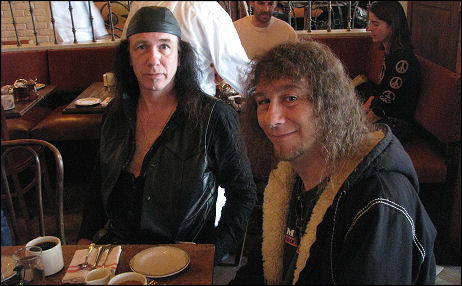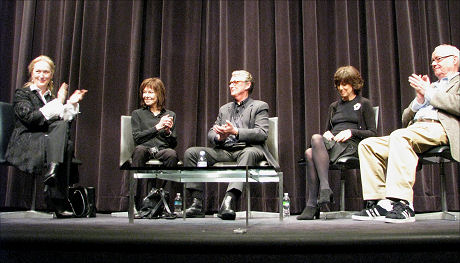I’m searching around for the story (stories?) I read two or three weeks ago that made it pretty clear that Fox Atomic, the Fox sub-distributor, was getting the hook. I’ve been feeling enervation from that outfit for months. I know Michael Fleming‘s story about the rumored plug-pulling, which appeared earlier today, sounded familiar.
 Jeffrey Wells
Jeffrey Wells
Original Vision
“The words ‘director’s cut’ on the cover of a DVD usually mean a few more minutes of gags too coarse to make the R-rated version shown in theaters,” N.Y. Times columnist Dave Kehr begins in a review of an unusual DVD release. “For the DVD release of his 1976 Nickelodeon, Peter Bogdanovich has done something different. The director’s cut is indeed a few minutes longer than the theatrical version (both are included on the new disc from Sony Pictures Home Entertainment), but more conspicuously it’s a black-and-white edition of a film originally released in color.
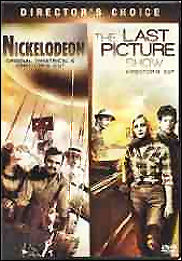
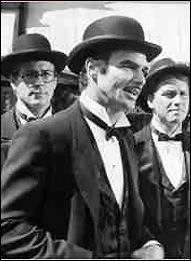
“Black and white had been Mr. Bogdanovich’s original choice for Nickelodeon, a comedy about the early days of American filmmaking that drew on Mr. Bogdanovich’s interviews with pioneering directors like Allan Dwan and Raoul Walsh. But even though Mr. Bogdanovich’s black-and-white films, The Last Picture Show (1971) and Paper Moon (1973), had been commercial and critical successes, monochrome was increasingly frowned upon by the studios.
“Even in color, though, Nickelodeon found little favor. The story follows two men from different backgrounds, Ryan O’Neal as Leo Harrigan, a Chicago lawyer who becomes a writer and director, and Burt Reynolds as Buck Greenway, a Florida pitchman who becomes a star. Many viewers found the film too broadly farcical in its first act and too darkly melancholic in its last, when the men’s friendship is tested by their mutual attraction to a wide-eyed young actress, Kathleen Cooke (Jane Hitchcock, a last-minute substitute for Cybill Shepherd, Mr. Bogdanovich’s protege.)
“In black and white Nickelodeon is obviously more true to its subject, and it has unexpected emotional effects as well. The broad farce and physical comedy of the first half seem less hysterical and eager to please, and the conflicted emotions and encroaching sense of lost innocence in the second half (a pattern followed by many of Mr. Bogdanovich’s films) seem more substantial and plangent.
“The director’s version wasn’t created simply by turning down the color knob: it’s the result of substantial work by Mr. Bogdanovich, the cinematographer Laszlo Kovacs (who died in 2007), the colorist John Dunn and Grover Crisp, the executive in charge of maintaining the Sony/Columbia library. Each shot was re-evaluated and retimed for black and white, using both traditional photochemical processes and new digital tools. It’s particularly striking how much more detailed and expressive the interior sequences appear.
“And as the movie becomes more and more nocturnal, approaching its somber, portentous ending, there is a new sense of emotional darkness devouring both the characters and the image.
“Here is one director’s cut that isn’t merely more of the same, but something substantially different and palpably superior. Nickelodeon now seems a much closer cousin to The Last Picture Show, which is also included this two-disc set, in an excellent new transfer.”
For A Price
News of the World‘s Mazher Mahmood reported today about a sting operation involving an “undercover fake sheik” that successfully hoodwinked the father of nine-year-old Slumdog Millionaire costar Rubiana Ali into offering his daughter for sale. Believing that the bogus sheik was willing to pay big-time, the dad, identified as Rafiq Qureshi in the story, reportedly offered to sell Rubiana for 200,000 quid.
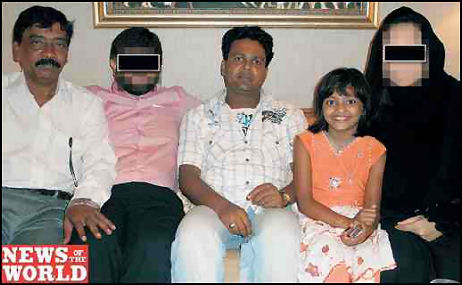
Nobody does icky like the British tabs, although it seems as if the the story might be legit. Rafiq “revealed his scheme to undercover News of the World reporters posing as a wealthy family from Dubai,” it says. “As he offered the deal, Rafiq reportedly declared “I have to consider what’s best for me, my family and Rubina’s future.”
The aroma of this story aside, it’s presumably understood that child-selling has been practiced in poor cultures for centuries. And it’s been depicted in two films without any implication that only scumbags would do such a thing. In an early portion of Nicholas Ray‘s King of Kings a tradesman, needing a helper, offers to buy the 12 year-old Jesus of Nazareth. In Federico Fellini‘s La Strada the story begins with Anthony Quinn ‘s Zampano, also needing an assistant, buying Guilietta Messina ‘s Gelsomina from her mother.
Anvil! Guys
How can Sacha Gervasi‘s Anvil! The Story of Anvil not wind up being nominated for Best Feature Documentary Oscar? It’s got heart, it’s about over-the-hill, down-on-their-luck artists getting their groove back, it’s well made, it’s connecting with audiences, it’s funny, it’s lowbrow-highbrow. How can Academy’s doc committee ignore it?
This is what I was thinking, at least, as I sat this morning with the Anvil! guys — Gervasi and band members Steve “Lips” Kudlow, Robb Reiner and Glenn Five — at a table at Gemma, the Bowery Hotel restaurant.
Who doesn’t love Anvil!? It’s got a 97% positive Rotten Tomatoes hoi polloi rating and a 100% positive creme de la creme one. Gervasi told me that Dustin Hoffman recently flipped for it and has actually seen it three times. I ran a review three days ago and called it “one of the saddest (as in funny-sad) and most recognizably human, emotionally touching rock-music documentaries I’ve ever seen.”
I mainly spoke with Gervasi and Five. (“Lipps” and Reiner were at the other end of the table.) Here’s an mp3 of our chat.
I was told the band did q & a’s at the Angelika Film Center yesterday and are doing two more tonight. They’re attending the Cannes Film Festival from 5.16 through 5.18 (i.e., market screenings) and plan to throw a party on a yacht out in the bay, and will perhaps stage a concert somewhere during their stay. The Anvil! DVD will come out sometime between late July and early September, and concurrent with this Anvil will begin a new tour called “The Anvil Experience” in which the film will be shown followed by a concert.
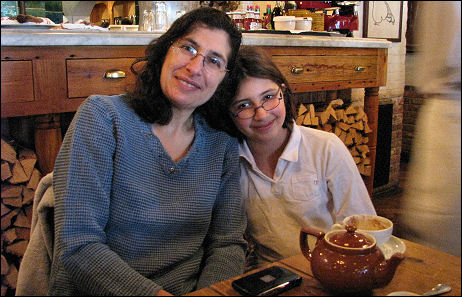
42West partner Cynthai Swartz, daughter Sarah Abramson.
Everything about Anvil! says “life can be fair, second chances are possible, not every loser or also-ranner bounces back but these guys sure did.”
42West partner Cynthia Swartz and 42West publicist Scott Feinstein organized and attended the brunch. And on top of this was the Portman coincidence.
Portman Again
After spotting Natalie Portman at last night’s Mike Nichols discussion at MOMA, I saw her again about an hour ago at Gemma, the Bowery hotel eating spot. I was there talking with the Anvil! guys at a big table, but since I’d written earlier this morning about her forthcoming appearance at the Soho Apple store on Friday, 4.24, I felt it couldn’t hurt to double-check.
So I went over, introduced myself — she initially gave me an “oh, shit…what’s this?” look. I showed her what I’d written (she and Christine Aylward co-hosting a discussion of a new web project called “Making Of”) and asked if I had it totally correct. She said yes, I said “cool” and went back to the Anvil! table.
Gathering of Wits
Last night Museum of Modern Art film curator Raj Roy hosted director Mike Nichols and four legendary collaborators — Meryl Streep, Elaine May, Nora Ephron and Buck Henry — in a moderately dazzling, often funny, at times chaotic group discussion about Nichols’ films, which are screening at MOMA now through May 1st. It mainly felt like a spirited dinner-table thing between Uncle Mike and the in-laws. A nice, raggedy, catch-as-catch-can vibe.
Nichols, Roy, Streep (star of Nichols’ Silkwood, Postcards From The Edge, and costar of Angels in America), May (Nichols’ comedy partner from the early ’60s), Ephron (screenwriter of Silkwood, Heartburn) and Henry (screenwriter of The Graduate, Catch 22, Day of the Dolphin) were onstage for roughly 75 minutes. Here‘s my edited mp3.
The beginning was a bit lurching and unfocused, I felt, and quite enjoyable for that. Roy asked a question that went on and on until he was stopped by Ephron when she said she was very much looking forward to hearing the question (or words to that effect).
Then Roy went in the other direction (i.e., under-explained) when he turned to May and said “perhaps you could talk to us about writing comedy, with Mike or with anybody?” May gulped, looked down, and said, “Uhm…if you could be a teeny bit more specific?” Huge laugh, mild embarassment. So Roy tried to elaborate but the words he was looking for weren’t quite materializing. And so Streep, feeling the angst and the struggle, suddenly chimed in and said, “Oh, I know what you’re trying to say!” And then she went off in her own direction.
Nichols debunked the auteur theory at one point, asserting that all films are collaborative efforts with dozens if not hundreds of people contributing in this and that way.
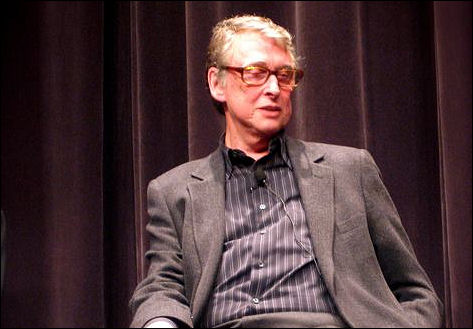
Streep recalled how Out of Africa director Sidney Pollack told her toward the end of shooting that he was sick of the physical chore of it all and that he couldn’t wait to “get back to Los Angeles and the editing room so I can make this movie.” Nichols, on the other hand, really loves the filmmaking process because of give-and-take familial atmosphere, and that he always gets a little gloomy when a film is about to finish.
Movies always take you back to the world in which they were made, Nichols said, but life has a way of overtaking them. “We ran Catch 22 just to check the print and it was almost like a documentary,” he said. Joseph Heller‘s book was fairly nervy and audacious for its time, he recalled, but “everything has caught up to it. The whole idea of everything being pure market forces [is] pretty much the way countries are run and certainly the armed forces.”
A question was asked about the casting of Dustin Hoffman in The Graduate. Nichols recalled a Mad magazine parody in which Benjamin Braddock says to his mother, ‘How come I’m Jewish and you and dad aren’t?’ I never said to myself, ‘I need a Jew here.’ But I needed an outsider. And then I thought of a guy that I saw in a play playing a tranvestite Russian…” Henry corrected Nichols by saying, “Actually a German tranvestite cripple. And [Hoffman] was totally convincing on all three things.”
Nichols spoke about how he’d screen-tested Robert Redford for the Braddock role, but told him over a game of pool later on that he was wrong for the part. “You were wonderful [in the test], I said, but you can’t play this part. ‘Of course I can!’ said Redford. No, you can’t, I said. You could never play a loser in a million years. ‘That’s not true!,’ he said. Then I asked him, ‘Have you ever struck out with a woman?’ and he said ‘what do you mean?'”
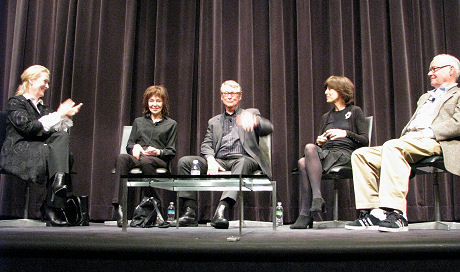
Nichols was born to German-Russian-Jewish parents (his given name was Michael Igor Peschkowsky) in Berlin, Germany, in 1931. His family moved to the U.S. in 1939 to flee the Nazis. He began as a comic performer, and the thing that gives Jewish comics their edge, I’ve always felt or sensed, is that they have acute feelings of dread and angst, which of course provide the fuel. I would have liked to hear Nichols expound on this, and to what extent the Nazis shaped his art.
I happened to see Natalie Portman, whom Nichols directed in Closer, on the way out. She and Christine Aylward will be co-hosting a Tribeca Film Festival event at the Soho Apple store on 4.24 in which they’ll discuss a new web project called ‘Making Of’ — a site that promises to transform the way people view, enjoy, and participate in entertainment.”
“How Can You Stand it?”
Jim Jarmusch‘s The Limits of Control (Focus Features, 5.1) has, at the very least, an intriguing soundtrack. Who’s the 20something dark-haired girl in the dark-rimmed glasses?
Step Up From Rotary
What’s your first reaction to this shot of legendary investigative journalist Seymour Hersh, who’s been a regular contributor to the New Yorker since the ’90s? Mine was an immediate assumption that if you took a similar shot of an equally hard-working younger journalist — certainly anyone from the GenX or GenY pool — you wouldn’t see them talking on a corded handset.

Fresh Picks
Three Blu-rays of interest on the not-too-distant horizon: (a) a Criterion Bluray of Roman Polanski’s Repulsion (due 7.28.09), which is especially welcome since only kick-around DVDs of this 1965 psycho-suspenser have been obtainable in recent years; (b) an MGM Home Video Bluray of Mike Nichols’ The Graduate, due on 6.2.09; and (c) a Disney Bluray of Snow White and the Seven Dwarfs, due 10.6.09.

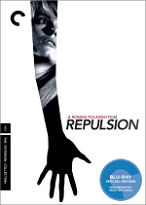
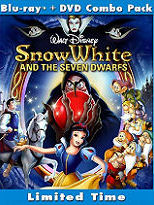
Pudgycakes
Am I hallucinating, or has N.Y. Times reporter Michael Cieply written a Hollywood Elsewhere-styled observation piece about how more and more leading actors are looking heavier and heavier? Do I not own this topic? Have I not staked out once-thin-but-now-overweight actors and filed a claim? Cieply even mentions the tendency of movie stars to have big heads, which I’ve also been riffing on for years.
“Based on a close look at trailers, still photos and some films already released, at least a dozen male stars in some of the year’s most prominent movies have been adding on the pounds of late,” Cieply says.
He mentions the girthy Denzel Washington, 54, and John Travolta, 55, in The Taking of Pelham 123. The wider-faced Hugh Grant in Did You Hear About the Morgans? The “better padded” Leonardo DiCaprio in Shutter Island. Plus Tom Hanks, Jason Segel and Vince Vaughan.
Let’s see — that’s seven. Didn’t Cieply say twelve? He mentions Seth Rogen but Rogen, of course, has lost weight recently. He could have mentioned upcoming comedy star Jonah Hill, I suppose, although Hill has always been fat. There’s certainly a striking difference in Kevin Costner of today vs. the one who starred in Field of Dreams and Bull Durham, but who doesn’t thicken as they age?
Obama Doc in ’09
11 days ago Variety‘s Tatiana Siegel reported that Sony has bought all int’l media rights (excluding U.K. TV) plus domestic home entertainment rights to Edward Norton, Amy Rice and Alicia Sams‘ By the People: The Election of Barack Obama. It will open in U.S. theatres via HBO Documentary Films, Siegel wrote, although she didn’t include a projected release date. In fact, she didn’t even spitball about a possible ’09 release.
That suggested to me that the doc would probably come out in ’10, which “will feel too late in the game,” I wrote. Well, scratch that. I don’t know why Siegel wasn’t told but By The People will come out this year (sometime in the mid to late fall, or possibly December), and in fact is right now in a finished-enough state that certain parties have seen it and raved. Which means it could qualify for ’09’s Best Feature Documentary Oscar. (Maybe.) Which means it could play at the Venice or Toronto Film Festivals…maybe. But it’ll definitely be in theatres before 12.31.09, to be followed by HBO cable playdates.
Norton’s Class 5 Films produced By The People; Rice and Sams directed.
“I Want To Be Your Friend”
I love how kneejerk righties are using this photo to sell the idea that President Obama is being somehow intemperate and/or naive in extending a limited form of friendship towards Cuba and Venezuela (and that country’s president Hugo Chavez) based on future cooperation. Anti-Americanism is always made, never born. Caribbean and South American leaders who’ve called out American politicians for acting with arrogance and authoritarianism and looking no further into any situation other than to determine what’s best for corporate interests aren’t necessarily wrong.


